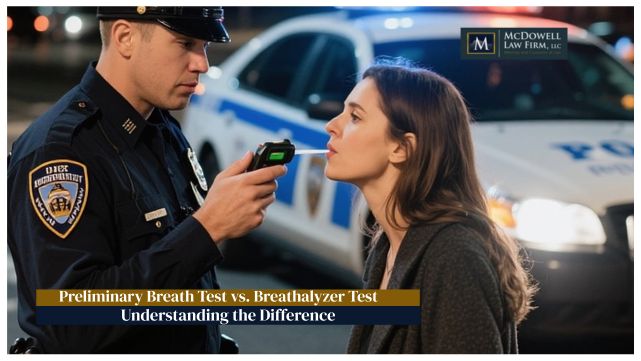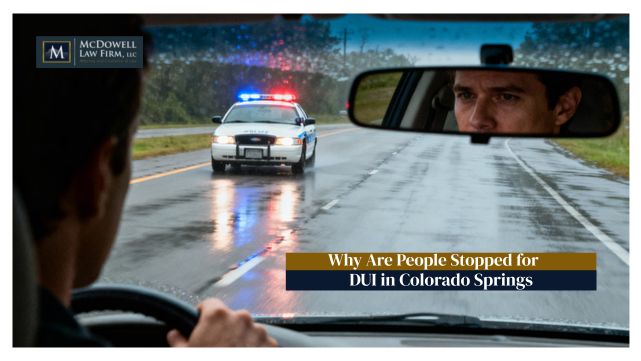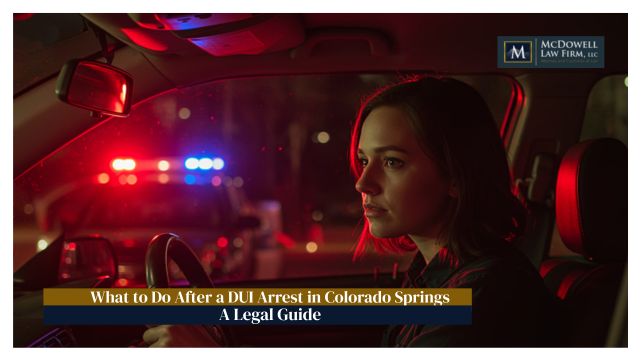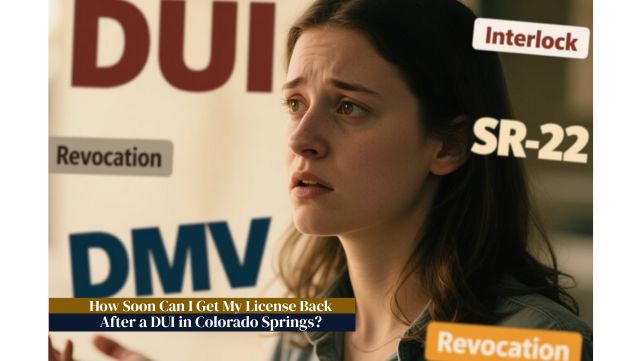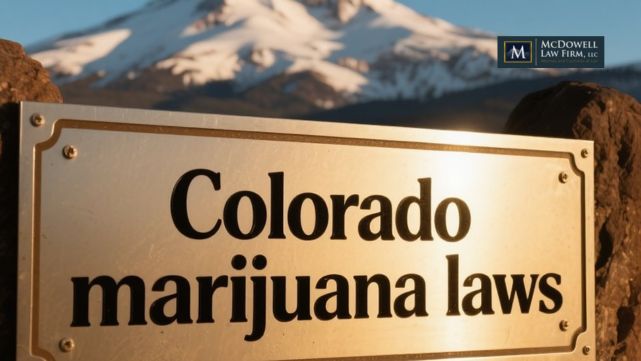You get pulled over in Colorado Springs. The officer suspects you’ve been drinking and pulls out a small handheld device. “I need you to blow into this,” he says. You think: Is this the breathalyzer test? Will this go on my record? Can I refuse?
Colorado actually uses two different breath tests during a DUI investigation. Understanding the difference between them could save your license and strengthen your defense. One is voluntary with no legal consequences for refusal. The other can trigger penalties at the DM and be used against you in court..
Here’s what you need to know about preliminary breath tests (PBT) and evidentiary breath tests in Colorado.
The Two Types of Breath Tests
1. Preliminary Breath Test (PBT)
- Small, handheld device used roadside
- Administered during initial investigation
- Taken before arrest
- Results not admissible at trial
- Completely voluntary
- No penalty for refusing
- No observation period required before test
2. Evidentiary Breath Test (Intoxilyzer)
- Large, calibrated machine at police station or hospital
- Administered after arrest
- Results admissible in court
- Subject to express consent law
- Refusal triggers automatic license revocation
- This is the “official” breathalyzer test
- 20-minute observation period
The confusion between these tests causes many people to make costly mistakes. You might refuse the voluntary roadside test thinking you’re protecting yourself, then take the station test that actually counts against you. Or maybe you’ve done the opposite. What does each choice mean, and how will it affect you in your case and at the DMV?
Misunderstanding your right to refuse a breathalyzer test in Colorado can lead to automatic license suspension and other legal consequences at the DMV and in court.
What is a Preliminary Breath Test (PBT)?
The PBT is a screening tool. Officers use it during roadside investigations to help determine if they have probable cause to arrest you for DUI.
How It Works:
- Officer asks you to blow into a small handheld device
- Device provides a digital BAC reading
- Takes about 30 seconds to complete
- Usually happens after field sobriety tests
Common PBT Devices in Colorado:
- Alco-Sensor
- Intoximeter Alco-Sensor FST
- Draeger Alcotest
What Officers Can Use It For:
- Establishing probable cause for arrest
- Deciding whether to conduct further investigation
- Supporting their observations of impairment
What It Cannot Be Used For:
- Evidence of your actual BAC at trial
- Proving you were over the legal limit
- License revocation proceedings (DMV hearings)
Why PBT Results Aren’t Allowed in Colorado Courts
Colorado law specifically prohibits PBT results from being admitted as evidence of guilt at trial. Here’s why:
Lack of Reliability
- PBTs are not as accurate as evidentiary machines
- They have wider margins of error
- Calibration standards are less stringent
- Environmental factors affect results more significantly
Not Scientifically Validated
- PBTs don’t meet Colorado’s evidentiary standards
- Haven’t undergone same testing as approved devices
- Results can vary significantly from actual BAC
Limited Purpose
- Designed only as investigative screening tool
- Not intended to measure precise BAC
- Only meant to detect presence of alcohol
The Colorado Supreme Court has consistently held that PBT results are investigative tools only and cannot be used to prove intoxication at trial.
Is Taking a PBT Voluntary?
Yes. The PBT is completely voluntary in Colorado. You can refuse it without any legal penalties.
No License Consequences
- Refusing a PBT does not affect your license
- No DMV revocation or suspension
- Express consent law does not apply to PBTs
No Criminal Penalties
- Refusal cannot be used as evidence against you
- No enhanced charges for refusing
- Officer can still arrest based on other observations independent of the PBT
What the Officer Won’t Tell You:
- PBT is voluntary (they often make it sound mandatory)
- You have the right to refuse
- Refusal has no direct legal consequences
Officers are trained to make the PBT seem required. They’ll say things like “I need you to take this test” or “Colorado law requires you to submit to testing.” This is misleading when it comes to PBTs.
I have seen hundreds of body cam tapes, and, commonly, officers won’t expressly state that a PBT is voluntary. They will often just pull out their PBT and ask the suspect to blow. I think that many people feel intimidated or want to cooperate with authority, so they just proceed with the test.
More people need to be educated about the law and the consequences surrounding preliminary breath tests, and make a decision based on that knowledge.
Should You Take a PBT When Offered?
This is a tactical decision. Here are the considerations:
Arguments for Refusing the PBT
- Results help officer establish probable cause for arrest
- Gives officer ammunition for affidavit and reports
- May convince officer to arrest when otherwise uncertain
- No legal penalty for refusing
- Can’t help you in court anyway
Arguments for Taking the PBT
- If you’re completely sober, it might convince officer to let you go
- Refusal might make officer more suspicious
- Officer may arrest you anyway based on other factors
- Shows cooperation during traffic stop
The Reality
If the officer is asking for a PBT, they already suspect DUI. Most officers have already decided to arrest you. The PBT just adds documentation to their case. Unless you’ve had absolutely nothing to drink and are completely confident you’ll blow 0.00, refusing is usually the safer choice.
Should I take the PBT?
I generally think that if you’re sober, it can’t hurt and will speed up the process of getting you back on the road.
If you have had anything to drink at all, I recommend against taking a PBT.
What Happens After You Refuse a PBT
The Officer Can Still
- Arrest you for DUI based on other observations
- Conduct field sobriety tests
- Smell alcohol on your breath
- Note bloodshot eyes, slurred speech, etc.
- Request evidentiary testing at the station
The Officer Cannot
- Force you to take the PBT
- Use your refusal as evidence at trial
- Revoke your license for refusing the PBT
- Charge you with any additional crimes
Your refusal of the PBT gives the officer one less piece of evidence when processing your case and establishing probable cause for your arrest. That’s usually a good thing for your defense.
The Evidentiary Breath Test: A Different Story
After arrest, you’ll be transported to the police station or hospital for an evidentiary breath test on an Intoxilyzer machine. Under Colorado Express Consent law, just by driving on Colorado roads, you’ve already consented to a chemical test of your breath or blood if the officer has probable cause to believe you ae under the influence of alcohol, drugs, or both.
How It’s Different from a PBT
- Much larger, calibrated machine
- Results are admissible in court
- Subject to strict testing protocols
- Requires 20-minute observation period
- Provides detailed printout with multiple readings
- Operated by trained, certified officers
Approved Devices in Colorado
- Intoxilyzer 9000 (most common)
- Other devices approved by Colorado Department of Public Health
Why These Results Are Admissible
- Machines meet scientific reliability standards
- Regular calibration and maintenance are required
- Standardized testing procedures
- Quality control protocols in place
- Officers must be certified to operate the machine
Key Differences: PBT vs. Evidentiary Test
| PBT | Evidentiary Test | |
|---|---|---|
| Timing | Before arrest, during investigation | After arrest, at a police station or hospital |
| Device | Small, handheld, portable | Large, stationary, calibrated machine |
| Admissibility | Not admissible at trial | Fully admissible in court |
| Voluntariness | Completely voluntary, no penalty for refusal | Subject to express consent, major penalties for refusal |
| Accuracy | Less accurate, wider margin of error | More accurate, meets scientific standards |
| Legal Consequences | None for refusing | 1-year license revocation for refusing (however you can apply for early reinstatement) |
| Purpose | Investigative tool to establish probable cause | Proof of BAC for criminal prosecution |
Understanding the Observation Period
One critical difference is the observation period required before evidentiary testing.
Before Evidentiary Test
- Officer must observe you for 20 minutes
- Ensures you don’t eat, drink, smoke, or vomit, burp
- Removable dental implants, piercings, and retainers should be removed
- Remove gum, mints, or anything else from the mouth.
- Prevents mouth alcohol contamination
- Required by Colorado law and testing protocols
Before PBT
- No observation period required
- Can be administered immediately
- More susceptible to false readings from mouth alcohol
- Another reason PBT results are unreliable
Failure to properly observe you before an evidentiary test can invalidate the results. PBTs have no such safeguards.
How PBT Results Can Still Hurt You
Even though PBT results aren’t admissible at trial, they can still affect your case:
Probable Cause for Arrest
- Officer can testify they conducted a PBT
- Can say the result indicated presence of alcohol
- Cannot state the specific BAC number
- Helps establish reasonable suspicion for arrest
Officer’s Affidavit
- PBT results appear in police reports
- Prosecutors see the results
- Influences charging decisions
- May affect plea negotiations
Your Knowledge
- If PBT shows high BAC, you know what evidentiary test might show
- Can inform your decision about evidentiary test
- The officer typically won’t share the actual number with you
Accuracy Issues with Both Tests
PBT Accuracy Problems
- Environmental factors (temperature, humidity)
- Mouth alcohol contamination
- Radio frequency interference
- Calibration drift
- User error in administration
Evidentiary Test Issues
- GERD and acid reflux create false readings
- Dental work can trap alcohol
- Certain diets (keto) produce acetone
- Medical conditions affect results
- Machine calibration and maintenance errors
Both tests have accuracy issues, but PBTs are significantly less reliable.
Common Scenarios and What to Do
Scenario 1: Officer asks for PBT, you’ve had 2-3 drinks
- Politely refuse the PBT
- Expect to be arrested anyway
- Preserve your right to refuse evidentiary test later
Scenario 2: Officer asks for PBT, you’ve had nothing to drink
- Consider taking it to demonstrate sobriety
- Should blow 0.00 and might avoid arrest
- Still have right to refuse
Scenario 3: You took PBT and it showed high reading
- Expect arrest
- Prepare for evidentiary test decision at station
- Contact attorney before deciding on evidentiary test
Scenario 4: Officer threatens consequences for refusing PBT
- Stand firm in your refusal
- There are no legal consequences for PBT refusal
- Don’t be intimidated by false claims
What Officers Say vs. What the Law Says
Officer: “Colorado law requires you to take this test.”
Reality: Express consent only applies to evidentiary tests after arrest.
Officer: “If you refuse, I’ll take your license.”
Reality: PBT refusal has zero effect on your license. But refusing an evidentiary test of your breath or blood, does. A refusal of the evidentiary test can revoke your license for a year.
Officer: “This will help you if you’re under the limit.”
Reality: If you’re under the limit, officer observations should be enough. PBT rarely helps defendants.
Officer: “I need you to blow into this device.”
Reality: “Need” is not the same as “legally required.” You can refuse.
Your Rights During Breath Testing
Before Arrest (PBT)
- Right to refuse with no consequences
- Right to remain silent
- Right to not perform field sobriety tests
- Not entitled to attorney before testing
After Arrest (Evidentiary Test)
- Right to know consequences of refusal
- Right to choose between breath and blood (if offered)
- Right to contact attorney if reasonably possible
- Right to understand express consent advisement
Strategic Considerations
If You’re Going to Refuse Something: Refuse the PBT (no consequences) but carefully consider the evidentiary test (major consequences).
If You’re Going to Take Something: Skip the PBT (doesn’t help you) and make an informed decision about the evidentiary test based on circumstances.
What Makes Sense
- PBT rarely helps defendants
- PBT refusal has no downside
- Evidentiary test refusal has serious downsides
- Each case requires individual analysis
Getting Legal Advice
If you’ve taken a PBT, refused a PBT, or face decisions about evidentiary testing, you need experienced legal counsel.
An Experienced DUI Attorney Can
- Explain how PBT results affect your case even if inadmissible
- Challenge the admissibility of evidentiary test results
- Identify testing protocol violations
- Contest the reliability of breath testing
- Negotiate better outcomes based on testing weaknesses
Time is Critical
- DMV hearing deadline is 7 days from arrest
- Evidence gathering starts immediately
- Prosecutor reviews reports quickly
- Early attorney involvement makes difference
Your Next Steps
Understanding the difference between PBT and evidentiary breath tests is crucial for protecting your rights during a DUI investigation. The PBT is a voluntary screening tool that can’t be used against you at trial but helps officers build probable cause. The evidentiary breath test at the station is the real test that counts for your criminal case and license.
If you’ve been arrested for DUI in Colorado Springs after taking or refusing either test, contact the Colorado Springs criminal defense lawyers at McDowell Law Firm immediately. We understand the science behind breath testing, the legal limitations on test results, and how to challenge unreliable evidence in court.
Don’t let confusion about breath testing hurt your case. Get experienced help from attorneys who know exactly how these tests work and how to fight them. Contact our Colorado Springs DUI defense team today for a confidential consultation about your case.

